Who are they
Depending on their responsibilities, these officials are divided into several categories:
- working with debtors and collecting money from them to repay the debt;
- armed guards guarding judges and other participants in the hearing;
- leaders.
Their activities are regulated by the relevant Federal Law, which we will try to understand in this article.
Functions of the Federal Bailiff Service
The roles of these bodies include:
- search for the defendant's property;
- arrest and confiscation of found items;
- valuation of seized property;
- its implementation.
Video on the topic:
Bankruptcy of individuals
from 5000 rub/month
Read more
Services of a credit lawyer
from 3000 rubles
Read more
Legal assistance to debtors
from 3000 rubles
more
Write-off of loan debts
from 5000 rub/month
More details
Deadline for debt collection through the FSSP
After the opening of production, the bailiff gets exactly 2 months to achieve a certain result. But in practice this period is much longer. The following factors are taken into account:
- waiting for a response from the debtor;
- conducting searches for property or the person himself;
- suspension during the case;
- terms of property sale. There are other issues that delay the deadline.
The maximum production period is 3 years. The debt does not disappear anywhere - after six months, the creditor can again initiate the debt collection procedure using a court order.
Rights and obligations of bailiffs 2021
They are quite closely related. But, before we get to know them, let's see what laws and regulations they are spelled out in.
Regulation at the legislative level
The activities of these civil servants are strictly regulated. This is written in:
- Constitution;
- Code of the Russian Federation on Administrative Offenses;
- Regulatory acts of the Ministry of Justice;
- Civil Code of the Russian Federation;
- Presidential Decree No. 1316, issued on October 13, 2004;
- Federal Law No. 118 of June 21, 1997;
- Federal Law No. 229, which entered into force on October 2, 1997.
Official actions to ensure the established order of court activities
According to current legislation, OUPDS authorities must:
- ensure that judges and other participants in the proceedings are safe while in the building (and in some cases, outside it);
- protect case materials and material evidence during the period when they are delivered to the point of proceedings;
- carry out the orders of the chairman of the proceedings;
- monitor public order;
- bring citizens who avoid appearing (only in accordance with the necessary resolution);
- stop crimes and other violations, as well as report them to the police department and the head of the investigation agency;
- guard the premises of the FSSP and the court;
- accompany persons with foreign citizenship or without it at all to special organizations or to the border of the Russian Federation where checkpoints are located (based on the necessary documentation on forced movement);
- undergo specialized military medical examination, training, and aptitude testing conducted every year;
- cooperate with the Department of Internal Affairs, military police of the Russian Armed Forces, as well as with others who guard or escort those arrested;
- assist in the search and detention of those who are hiding from investigation and inquiry or trial;
- assist the employee during enforcement proceedings, as well as the investigator.
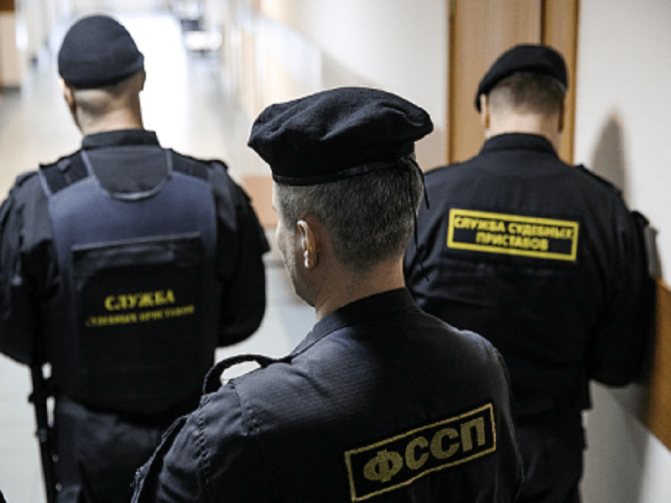
Responsibility for actions
The duties of a bailiff impose responsibility on him. The bailiff is responsible for:
- Any decisions, omissions or unlawful actions may be appealed. To do this, they turn to a higher-ranking person or to the court. In addition, an appeal submitted to a superior person is not an obstacle to filing an application in court.
- According to the laws of the Russian Federation, the bailiff is responsible for any misconduct or violation of the law.
Damage that may be caused to a citizen or organization is subject to mandatory compensation in the manner established and provided for by law. The Prosecutor General of the Russian Federation, as well as the persons who report to him, monitor the implementation of laws and the procedure for carrying out actions.
When collecting funds for the maintenance of a minor
If you don't pay child support, then employees have a reason to visit you. In this area, the powers of FSSP bailiffs include:
- act in accordance with professional ethics;
- carry out duties based on legislation, and also prevent infringement of the rights of those participating in the production;
- non-disclosure of family or personal secrets of all parties;
- exclusion of interest and actions only within the framework of the law;
- conducting the process in full, observing the established deadlines.
A variety of methods are used against debtors to force them to pay their debt. But the most common ones include a ban on leaving the Russian Federation or seizure of property. But there is a list of property that is prohibited from being confiscated:
- household items: kitchen utensils, food, clothing, etc.;
- money, if their amount does not exceed the established subsistence level;
- things that are the only source of income, for example, a laptop or car;
- housing, but only if you have nowhere else to live (an exception to the rule is mortgaged apartments);
- objects belonging to the spouse or other family members (provided that this is confirmed by documents).
Thus, the bailiff cannot take any property from you. The permitted list is strictly defined by law.
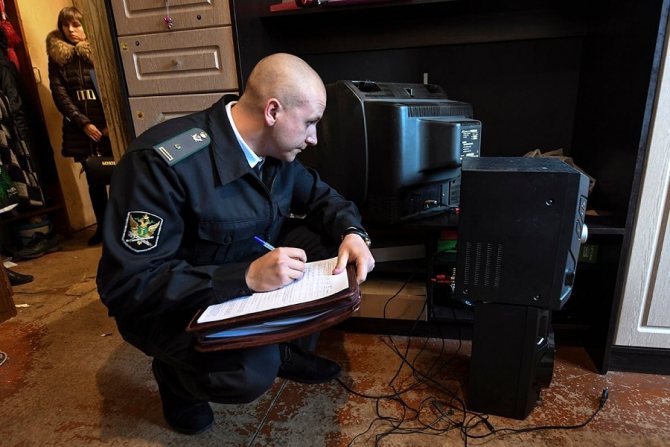
Debt collection
Based on the articles of Federal Law No. 118, an employee must:
- execute all documents correctly, completely and on time;
- give all participants the opportunity to study the documentation and case materials, as well as make extracts and copies;
- consider applications, as well as issue the necessary orders, set appropriate deadlines and explain the rules for appealing;
- in case of personal interest, withdraw from the process;
- engage in the receipt and processing of personal information, if necessary, in order to carry out production correctly and on time;
- conduct a case of an administrative offense based strictly on existing laws;
- notify the senior bailiff about detected signs of a crime.
Read Collectors during bankruptcy proceedings: what to say during the process when they stop calling

Remember that the employee can seize your property, resell it, and pay off the debt with the proceeds. However, there is a caveat here: an arrest can only be carried out in the presence of two witnesses, and objects included in the list of exceptions cannot be confiscated.
All seized items are described in the document. After this, the bailiff must draw up an act of seizure, put his signature on it, as well as the witnesses and the defaulter.
Important: if you refuse to sign, the paper does not lose its legal force. A special note is made in it.
After this procedure, you will, unfortunately, no longer be able to use the described property.
A little about remuneration
How thankless this job is can be judged by the payments that the state provides in case of impairment of the bailiff’s ability to work.
Such an employee receives about 20,000 rubles, plus or minus allowances and bonuses. In the event of his death, the state pays 180 times the average monthly salary. By simple mathematical calculations we get 3 million 600 thousand rubles. Is it worth the life of someone's son or father?
If everything turned out not so tragic, but it is no longer possible to work as a bailiff (read: disabled), the law obliges you to pay compensation 36 times the amount - 720,000 rubles.
Of course, in both cases the state pays the pension, but the result will not change. A bailiff is a person who risks his life.
According to the writ of execution
As we said above, a FSSP employee must act strictly in accordance with the law. But every duty has its “but”. Let's see which one:
| What can it do | Exceptions |
| Come to the debtor strictly between 6 am and 10 pm | Before or after this time, as well as on weekends, visits to bailiffs are prohibited by law |
| Seize property only if its owner is in debt | Do not touch property that is not subject to seizure |
| Give warnings to the defaulter about the possibility of harsh measures to collect the debt | Threaten life or health |
| Pick a lock if you don't open the door | Provided that you legally own the property |
The employee must also:
- notify the parties to the process about all its stages;
- carry out collection actions based solely on a court order.
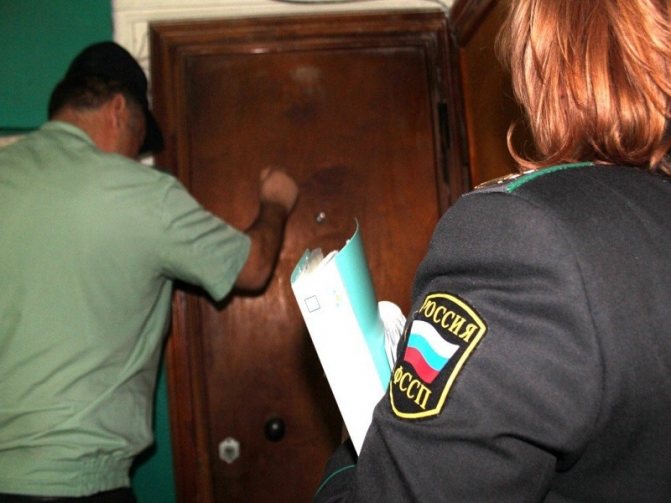
On the implementation of court decisions
According to Federal Law No. 229, the contractor has the following list of powers:
- Invitation to receive a debtor or collector using a summons, call or other method in accordance with legislative acts.
- Collection of information from the parties necessary for the correct conduct of the case;
- Requesting clarification from the recipient and the debtor, as well as certificates and other necessary documents.
- Carrying out checks, which includes receiving and reviewing financial documentation through the employer.
- If the employee has written permission from the senior bailiff, he has the right to enter the defaulter’s premises.
- Putting on the wanted list a person who has a debt, as well as his property.
- Use non-residential premises to store confiscated property, as well as use the vehicle of the defaulter or collector to transport valuables. This is done only with the consent of the parties, but all costs are borne by them.
- Work with applications and petitions.
- Control and restriction of travel outside the borders of the Russian Federation.
- Carrying out other actions in accordance with production and assisting its implementation.
Does a bailiff have the right to seize a pension?
Alas, according to current legislation in force today, a FSSP employee can confiscate pension accruals, which include payments due to old age or disability.
But there is also an exception here: the employee cannot withdraw income from the loss of a breadwinner.
The amount written off from the debtor is set in accordance with the size of the debt. Most often it does not exceed 50% of the debt, but in some cases it can increase to 70 percent. For example, if it is necessary to compensate for harm caused or moral damage.
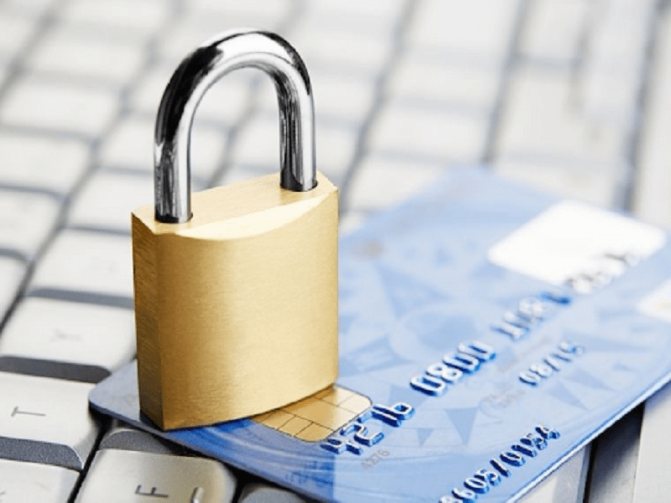
Can a bailiff touch a bank account?
During collections necessary to repay a debt, the bailiff has the right to confiscate not only valuable property, but also the defaulter’s money lying in the bank.
It is important to note that write-offs can be made not only from card savings, but also from settlement savings. But, in any case, for such actions the performer must have compelling reasons, such as:
- order or order of the court;
- an order to collect debts or other types of costs from an organization vested with such power and control functions (for example, a pension fund);
- availability of a writ of execution.
But there is a list of savings that the employee does not have the right to recover:
- compensation for personal injury;
- benefits paid due to the loss of a breadwinner;
- due to disability or injuries acquired during work;
- compensation issued due to radiation or man-made disasters;
- money issued to care for a person who is disabled;
- reimbursed funds for travel or purchase of medications;
- benefits for the death of a person or the birth of a child, including maternity capital;
- reimbursed amounts for moving to another region for employment.
How much can bailiffs write off from wages?
If the bank card is only a salary card, then you need to inform the employees about this. In this case, they can withdraw no more than 50% of the money received into the account last time, regardless of how many writs of execution were received at the debtor’s place of employment. This point is spelled out in Federal Law No. 229, Article 99 Part 2.
Read Imaginary and feigned transaction, what is it in simple words, consequences and differences
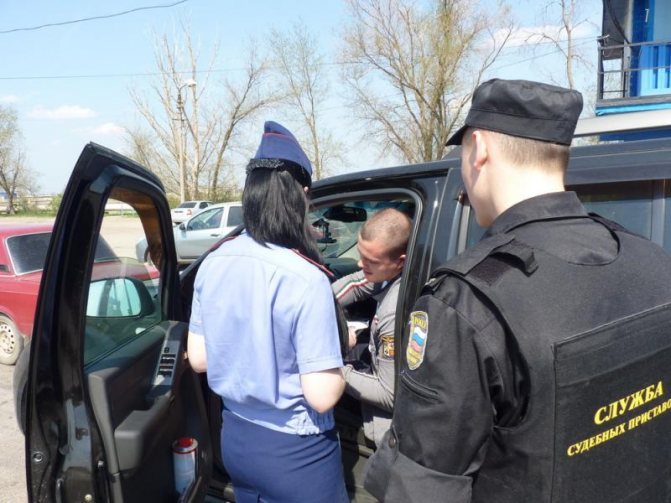
Confiscation of driver's license
More recently, changes appeared in Federal Law No. 229, namely in Article 67 Part 1. Now bailiffs can seize another document from defaulters.
It is important to note that this seizure is temporary and continues until the debt is repaid.
Such a restriction can be used for both individuals and legal entities, in particular individual entrepreneurs, if they do not:
- compensated for damage to health or due to the death of the breadwinner;
- paid alimony;
- compensated for moral or property damage that was caused as a result of the crime committed;
- covered harm of a non-property nature associated with the upbringing of minors.
Employees can use this power only if the deferment period has ended and the debtor has not complied with the requirements of the writ of execution.
Procedure after trial
After a court decision is received and the case is put into proceedings, the actions of bailiffs are subject to a clear structure:
- a writ of execution is accepted;
- proceedings to enforce the decision are initiated;
- the debtor is given a period during which he can voluntarily repay the debt;
- Relevant requests are sent to the State Traffic Safety Inspectorate and the State Register, which confirm or refute the data on the debt;
- a resolution is issued, which specifies the measures of compulsory collection;
- consist of measures to seize or otherwise restrict property for the purpose of executing proceedings;
- a resolution on the enforcement fee is issued. This decision is issued only after it has been officially established that the property belongs to the debtor;
- a resolution is issued indicating the completion of enforcement proceedings. This resolution states that all coercive measures have been taken and the citizen no longer has debts;
- decision to remove measures. This resolution is the most important. After completing the necessary measures, all restrictions previously imposed on the citizen and his property are lifted. Must be carried out within 3 days from the date of issue.
We suggest you read: The liability agreement has not been signed
Having received the writ of execution, the plaintiff, who is now the claimant, must check the presence of all components of the document. This is necessary, because if at least one detail is missing, the bailiff will refuse to perform his duties and this action will be legal. In real life, the debtor's year of birth or place of birth may be missing.
The document must contain the following information:
- Full name and address of the court where the case was heard.
- Case number and title.
- Date of drawing up and delivery of the writ of execution.
- Information about the creditor and the debtor, among them there must be data such as full name, address of residence, registration and birth; for the debtor, the date of birth and place of service, if known, are also required. If the debtor is a legal entity or a state authority, self-government body, or state enterprise, then the name and address will be required.
- The part of a court decision that lists the reasons and requirements for the debtor's obligations and for the transfer of money or property to the other party.
- Bank account number to which the money will be sent.
What can bailiffs arrest in an apartment?
According to the law, FSSP officers can confiscate any valuable property (with the exception of the list established at the legislative level), such as electronic and household appliances, money if their amount is above the subsistence level, jewelry, etc. But please note that these things must belong specifically to the defaulter. The objects of spouses or other family members cannot be seized if there are documents confirming their right of ownership.
What is prohibited from confiscation
This point is spelled out in the Civil Procedure Code of the Russian Federation. According to it, arrest cannot be imposed on:
- household and electronic appliances, as well as essential items (for example, a refrigerator);
- food;
- money, provided that their amount is less than the subsistence level;
- things that are the only source of income (for example, a car or a computer, but only if their cost is below 100 minimum wages);
- pets (except those used in commercial activities);
- personal property, except jewelry and decorations;
- property that provides normal living conditions (the clause applies to people with disabilities);
- gifts, awards, orders, etc.;
- property assets already pledged in other cases.
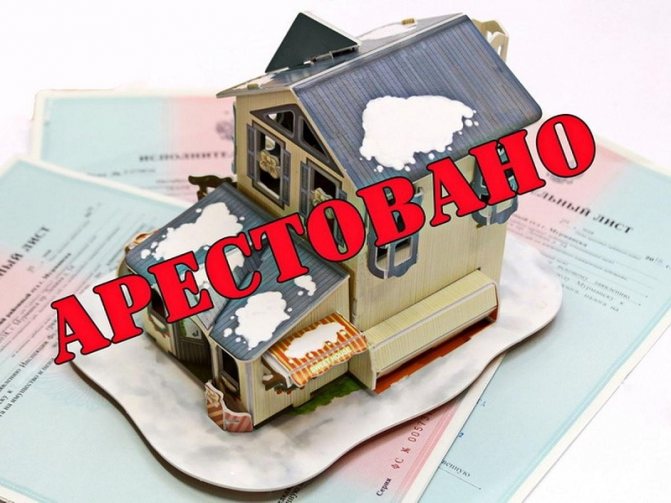
But at the same time, the perpetrators can arrest:
- housing (except for cases when it is the only one for the debtor and his family members);
- car or other vehicle;
- bank account (both current and credit).







